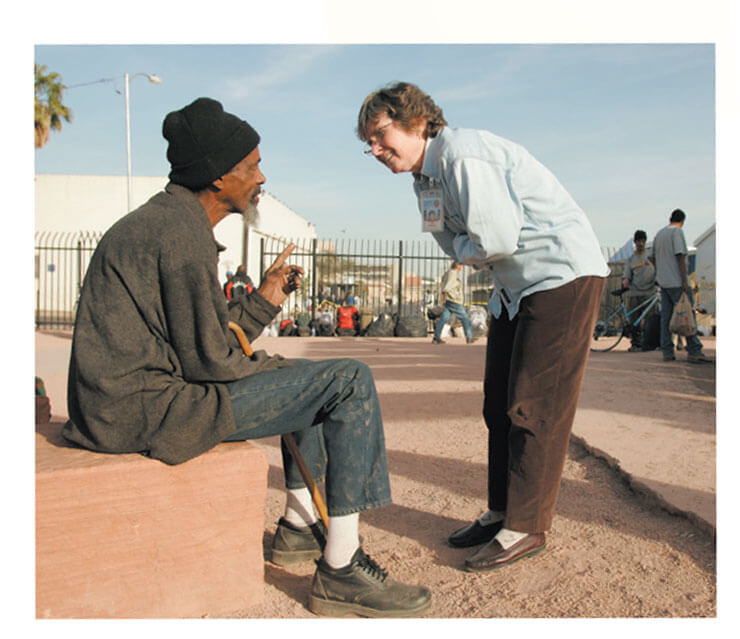
Beginning two Sundays back with Jesus’ parables of the prodigal son and then the unjust manager, the Church hears gospel stories that only Luke tells. Luke presses distinctive themes — investing in the poor, the importance of prayer, forgiving sins and debts. In this Sunday’s gospel Luke tells Jesus’ story of how God will reverse the fortunes of rich and poor.
The gospel gives spare but significant details about the rich man’s lifestyle. He is not a king or prince but dresses in the royal color and wears fine linen. A feast is his regular, everyday fare. The story gives the man no name, rather his wealth and comfort define him.
Lazarus, on the other hand, has a name but no money or food. He is sick with sores that afflict him. Only a dog, an animal unclean according to Jewish law, reaches out to him and licks his sores.
Disturbingly, Lazarus lies at the rich man’s gate. He is not at the city gates or the temple doors. He is near. In fact, Lazarus is so near that the story tells us he sees scraps fall from the rich man’s table and longs to eat them. He is the nearest poor man, the one the rich man might have noticed and helped.
The many poor people panhandling in our cities put Sunday’s gospel squarely on our doorsteps. Like the rich man, most of us have poor people at our gates — our subway stops, our ATMs, the doorways of our churches. Some have burned out every relationship in their lives for booze or drugs. Others don’t have a stable enough lifestyle to stay on their medications.
In small towns people often know people in need and do what they can for them, though not always. But in cities poor people become anonymous. Their presence and number can seem menacing to our own well-being.
- Who begs at your gate?
- What assumptions do you make about people who are poor? How do you compare them with yourself?
- What value do you find in distancing yourself from people in need? What value have you found in connecting with them?
- What do Jesus and Luke consider the ideal relationship between Christians and the poor at our door?
The great abyss that yawns between Lazarus and the rich man in the abode of the dead exists already in the distance between them when they are alive. The rich man never notices Lazarus begging or responds to him. He doesn’t know the other man exists. The rich man has no idea that his riches are anything but well-deserved blessings from God. He has no other ethic than spending his money on himself. He builds no connection between himself and the poor man at his gate.
The two characters in Jesus’ story represent extremes. The poor man is sick, hungry, and poor — about as down and out as he can be. The well-clothed, well-fed rich man is as oblivious as he can be. The story invites us to place ourselves on the continuum between the two.
The fortunes of the two characters in Jesus’ story reverse. The poor beggar who had no friend but a dog rests in the bosom of Abraham, a metaphor for belonging to God. But thirst and heat torment the man who had so many creature comforts while he lived. At this point in the story when he is in need, the rich man refers to Lazarus by name, suggesting that he had seen the beggar, knew his name, and refused to help.
Jesus’ story criticizes the rich man’s view of life. He deserves torment, while Lazarus belongs with God and Abraham and deserves blessing. The rich man’s distance from Lazarus becomes an impassable abyss.
Parker Palmer, who works to restore public spaces such as gates, streets, subway and bus stops as places of conversations and civility, studies people’s growing fear of one another. He notes that people who go regularly into city centers for their work tend to be much less afraid of violent crime against them than those who have moved to suburbs to get away from such violence and no longer have any regular, real experience of center- or inner-city life.
Many people rely on the media as their source of information about life in the city. They have no real experience to counter the violence the media repeatedly report, so they become increasingly fearful and reclusive. They put security systems in their homes and cars to protect themselves from the encroachment of violence. An abyss yawns between the people of city and suburb, city and country.
- What relationships that go beyond giving a check might your community of faith nurture between rich and poor?
- What roles might your parish play in helping rich and poor, city and suburban people meet, mix, and connect?
Sunday’s gospel takes a double-edged turn when the rich man asks to warn his brothers about his punishment. With one edge of judgment, Abraham insists the rich man’s brothers can learn from Moses and the prophets to do justice to the poor. For example, Psalm 1 praises the just person, who meditates on the law day and night, studying it in order to seek all it requires. The prophets make justice for the poor, especially widows and orphans, the measure of fidelity to God.
With a second edge of judgment, Abraham insists that a person who will not learn justice from the law will never believe a witness from the dead. His statement indicts people who claim the law is from God without keeping it. Luke implies those who do the work of God will recognize that Jesus’ work and witness are from God, too.
- What public policies clearly support or clearly burden people who are poor?
